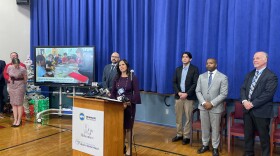More than a decade ago, residents living near the last operating landfill within Milwaukee's limits were presented with a challenge -- as well as an opportunity. As the landfill closed, neighbors organized. And today, a 20-acre park - featuring a labyrinth, bronze sculptures, a playground and more - stands in its spot.
Near the spot where West Keefe Avenue meets the Menomonee River Parkway, Milwaukee’s Commissioner of Public Works Ghassan Korban touts the park as a stormwater management marvel.
“We built a two-acre pond that basically serves as a way to drain a neighboring 350 acres worth of private property surrounding the park. Absence of the pond itself, all that run-off, carrying all the pollutants and sediments, oil and grease and trash goes directly into the river,” he explains.
Korban sings the system’s praises for its capacity to slow and treat five million gallons of stormwater.
Neighbor Lynne Woehrle says while she’s all for keeping pollutants out of the Menomonee River, she had not sketched a detention pond into her dream park.
Yet, she admits, it helped bring Hartung Park’s 20-acres to luscious life.

"The pond came into the project because there was an opportunity for funding. So we would put a detention pond in this space, and then the labyrinth was written into that space,” she says.
Workers created the large circular labyrinth by laying patterns of cobblestone salvaged from old Milwaukee streets. Woehrle calls it a popular attraction for young children and playful pets.
Backing up to the year 2004 when she moved to the neighborhood, Woehrle had no notion of a park. Instead, what she saw and heard were heavy trucks moving on and off the site in a steady stream.
“All day for eight to 10 hours, you’d hear beep beep beep because the trucks were always backing up.” Woehrle adds, “It was the last City of Milwaukee landfill within the city boundaries.”
To Woehrle’s surprise, one year later Milwaukee announced plans to close the landfill. Neighbors gathered to learn more.

The gathering planted the seed of the Hartung Park Community Association. Neighbors on both the Milwaukee and Wauwatosa sides joined in, including Woehrle, to volunteer their talents.
She says the group turned what might have been a lackluster plan into something magnificent.
“Originally the plan was just finish the landfill, cap it off, and do what most places do and just relatively uninteresting place. But as you look around you, we are anything but flat grass as we walk up the hill and start to puff a little bit,” Woehrle says.
From its highest point, prairie plantings take root at your feet. Below children scramble onto swings and whoosh down slides. Then there’s the public art that rings the playground – and teaches about the park’s ancient history – long, long before it was the Hartung Quarry.
“This region would have been under water and it would have been the form of a reef, a Silurian Reef,” she says.
>> More on Wauwatosa's Ancient Coral Reef
Thanks to Woehrle’s grant-writing skills, the neighbors ordered re-creations of some of the creatures that thrived in the ancient Silurian habitat.

“They’re all bronze. You can go knock on them and find out. It’s a favorite activity for most of the children. We wanted people to come up and touch them – that’s the point of public art,” she says.

It’s a favorite pastime of Anna Hackbarth’s four year old. “That was his first love, just looking and climbing amongst the statues and asking what’s this one, It’s so educational.” Hackbarth adds, “I just love it here.”
The park’s board members don’t meet as frequently as they once did, but Lynne Woehrle says everyone’s working on some aspect of the park, such as devising more ways to pump education into the park.
“And then we have an annual meeting of all of our neighbors, and even if people aren’t members, they can come. We have an ice cream social the first Saturday in June,” she explains.
Woehrle says the group is proud of two things: nurturing a special green space and breaking down barriers.
“It’s not a typical neighborhood association because it crosses over two cities – we lap over the boundaries,” she explains.














